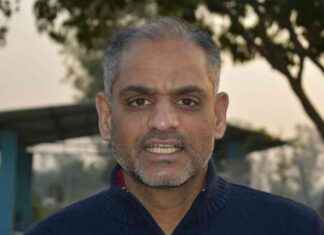Federal Economics and Climate Protection Minister Robert Habeck is promising a multi-billion dollar subsidy program for the hotly debated step-by-step replacement of the heating system with more climate-friendly models. His ministry announced today in Berlin that this should be based on income.
“Nobody runs into the basement and rips it out,” said the Green politician, referring to the gas or oil heating systems that are currently still in use. There should therefore be “numerous exceptions, transitional solutions and deadlines,” according to a paper entitled “Renewing prosperity in a climate-neutral manner,” which Habeck presented.
“Still a lot to do”
Overall, he already sees progress in the climate-friendly restructuring of the economy and society. “Of course there is still a lot to do, the tasks are big,” he explained. “But despite everything, we are at the beginning of a social dynamic. The start of renewal has been made.” Habeck’s ministry published a “workshop plan”.
In the concept, he explains how the climate-friendly restructuring of the economy and society should be further promoted. A lot is on the way, sometimes the question of the “big plan” is asked, said the minister. “And I want to give that one today.” Everything is geared towards the goal of making Germany climate-neutral by 2045 – i.e. not emitting more greenhouse gases than can be captured again.
Renewable energy
In order to generate the annual target of 700 to 750 terawatt hours of electricity from renewable sources by 2030, the previous amount would have to be doubled. The planning and approval of wind turbines on land, for example, took far too long, the ministry speaks of 9 to 17 years. “The lost time of the last ten years still hangs in our clothes like lead,” said Habeck.
Before the end of the year, his house wants to conclude a “pact for planning, approval and implementation acceleration” with the federal states. At a “wind power summit” on March 22, Habeck wants to present the cornerstones of a wind-on-shore strategy, and the paper should be ready by the time of a second industry meeting in April.
Habeck is planning a feasibility study for the resettlement of the solar industry, which has experienced a decline in Germany. “The delicate plants of the solar industry that we still have in Germany want to flourish,” he said. This Friday, Habeck wants to present the first draft of a new strategy at a “PV summit” (PV stands for photovoltaics, i.e. solar systems), which should be ready on May 3rd. Habeck wants to make it easier to install solar systems in industrial and commercial areas.
Proposals announced for this year, with which the ministry would like to distribute the costs of the energy transition “more fairly”, could become explosive. Business and households are currently paying higher prices through grid fees, especially in regions where a particularly large amount of electricity is generated from renewable energies.
hydrogen
Some companies are likely to continue to need gaseous energy sources for their production in the future. This is where hydrogen comes into play, which is considered climate-friendly if it is produced with the help of renewable energies.
But there are still no networks for its transport and so-called electrolysers – mostly for the splitting of water – for its production. The ministry is planning its own law for 2023 and wants to find more suppliers.
power plants
Wind and sun do not always provide energy. Power plants have to fill the gap. Habeck intends to present a strategy in this area by the summer. He sees a need for expansion and modernization of between 17 and 25 gigawatts of capacity by 2030. New gas-fired power plants are to be built in such a way that their operation can later be switched to more climate-friendly hydrogen .
industrial electricity price
German industry complains about high energy prices. The industrial policy spokesman for the left-wing faction, Alexander Ulrich, spoke of a “massive threat to our economic basis”. With the increasing electrification of many processes, electricity is said to play an increasingly important role. Habeck’s house is therefore working on a phased model for a special low industrial electricity price.
“It must be open to all sectors, be accessible to energy-intensive medium-sized companies as well as to industry and compensate for the disadvantages compared to our competitors in the USA and China,” demanded the economic policy spokesman for the SPD parliamentary group, Bernd Westphal.
raw materials
Without important raw materials, the conversion to new technologies does not work, but Germany is very dependent here – among other things on metals from China, South Africa or Russia. The Ministry of Economic Affairs therefore wants to enter into partnerships with other supplier countries, promote mining in Germany and Europe and also revise the mining law.
professionals
There is a lack of specialists for the energy transition. According to the ministry, there is a shortage of more than 200,000 skilled workers in the wind and solar industries alone. In the semiconductor industry, there are therefore 62,000, where every second job is not occupied. Habeck wants to counter this by promoting qualifications, for example for installing heat pumps and recruiting young people.
district heating
Habeck also wants to promote their use – such as waste heat from industrial plants for heating apartments – with a heat planning law. He is planning a “district heating summit” for the summer.












